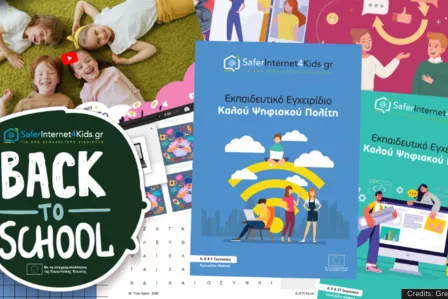The new school year in Greece has kicked off with a campaign on misinformation and safe online gaming. Through lesson plans, quizzes, videos, posters, fairy tales and activity booklets, students of all ages are receiving online safety education which will help them to adopt a code of values to deal with the emerging risks of using technology.

As is the case every year, the Greek Safer Internet Centre – managed by the Foundation of Technology and Research – has created and published new digital material for each educational level via the saferinternet4kids.gr platform. This year’s Back-to-school package contains materials which can be used as a tool in the classroom or at home. The package provides a range of materials aimed at young children, older primary school students, junior high school/high school students, as well as parents and educators.
Through the handbook on disinformation, educators in secondary schools can help students learn to distinguish between true and false information when surfing the internet, how to detect propaganda, and how to spot the 'hidden agenda' of what they read or see online. Alongside the manual for students is a manual for teachers which includes an analysis of teaching methods, suggested answers, and topic ideas to promote further discussion.
For students in the final grades of primary school, emphasis is placed on safe online gaming. Through a lesson plan, educators are supported to teach children respect and healthy interactions during online gaming. An activity booklet is also included where students consider, among other things, different scenarios that can happen when playing online games.
A regular character in the Greek Safer Internet Centre’s resources, Athena embarks on new adventures to teach young kindergarten and primary school children how to use the internet safely. Through a new fairy tale, titled "Grandma be careful on the internet", young students learn how to take their first safe steps in the digital world. The story is accompanied by an activity book where children learn by playing.
The helpline specialists of the Greek Safer Internet Centre, Help-line.gr, have produced a brochure giving advice on how parents and guardians can discuss sensitive issues with children such as the exposure of minors to inappropriate online content. A further brochure includes instructions on how to start conversations with children about general issues regarding safe internet use.
Finally, a comprehensive guide to online gaming gives educators and parents the support and confidence they need to manage issues such as screen time, spending within games, and access to age-appropriate content for each child.
Find more information about the work of the Greek Safer Internet Centre, including its awareness raising, helpline, hotline, and youth participation services – or find similar information for other Safer Internet Centres throughout Europe.
The new school year in Greece has kicked off with a campaign on misinformation and safe online gaming. Through lesson plans, quizzes, videos, posters, fairy tales and activity booklets, students of all ages are receiving online safety education which will help them to adopt a code of values to deal with the emerging risks of using technology.

As is the case every year, the Greek Safer Internet Centre – managed by the Foundation of Technology and Research – has created and published new digital material for each educational level via the saferinternet4kids.gr platform. This year’s Back-to-school package contains materials which can be used as a tool in the classroom or at home. The package provides a range of materials aimed at young children, older primary school students, junior high school/high school students, as well as parents and educators.
Through the handbook on disinformation, educators in secondary schools can help students learn to distinguish between true and false information when surfing the internet, how to detect propaganda, and how to spot the 'hidden agenda' of what they read or see online. Alongside the manual for students is a manual for teachers which includes an analysis of teaching methods, suggested answers, and topic ideas to promote further discussion.
For students in the final grades of primary school, emphasis is placed on safe online gaming. Through a lesson plan, educators are supported to teach children respect and healthy interactions during online gaming. An activity booklet is also included where students consider, among other things, different scenarios that can happen when playing online games.
A regular character in the Greek Safer Internet Centre’s resources, Athena embarks on new adventures to teach young kindergarten and primary school children how to use the internet safely. Through a new fairy tale, titled "Grandma be careful on the internet", young students learn how to take their first safe steps in the digital world. The story is accompanied by an activity book where children learn by playing.
The helpline specialists of the Greek Safer Internet Centre, Help-line.gr, have produced a brochure giving advice on how parents and guardians can discuss sensitive issues with children such as the exposure of minors to inappropriate online content. A further brochure includes instructions on how to start conversations with children about general issues regarding safe internet use.
Finally, a comprehensive guide to online gaming gives educators and parents the support and confidence they need to manage issues such as screen time, spending within games, and access to age-appropriate content for each child.
Find more information about the work of the Greek Safer Internet Centre, including its awareness raising, helpline, hotline, and youth participation services – or find similar information for other Safer Internet Centres throughout Europe.
- misinformation gaming
Related content
- < Previous article
- Next article >












